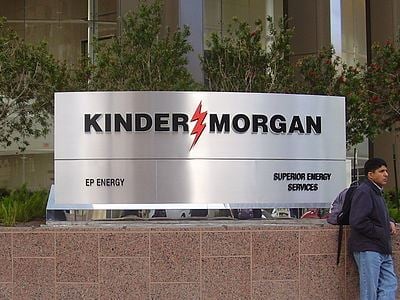Energy
Kinder Morgan Still Talks About Expansion as Revenues Shrink
Published:
Last Updated:

Distributable cash flow (DCF) is a non-GAAP measure that is roughly comparable to net income and is Kinder Morgan’s preferred way of comparing basic cash flows to the cash dividends it expects to pay shareholders. Another way of looking at DCF is as coverage in excess of dividends. DCF for the first quarter totaled $0.58 per share, up from $0.55 in the year-ago quarter. Kinder Morgan will pay a dividend of $0.48 per share to shareholders of record on April 30, up from $0.42 in the first quarter of last year and up from $0.45 sequentially.
DCF is higher year-over-year but net income is lower due to higher interest expense, book taxes and DD&A expenses. The increase in DCF is attributed to the merger transactions of last November.
ALSO READ: 5 Potential MLP and General Partner Buyout Candidates
Chairman and CEO Richard Kinder had this to say:
Despite some headwinds due primarily to a rough commodity pricing environment, … [o]ur first quarter performance demonstrated once again that our large diversified portfolio of mostly fee-based assets can produce good results even in tumultuous market conditions. … Our current project backlog of expansion and joint venture investments is $18.3 billion.
In its outlook discussion, Kinder Morgan said it expects to pay a total fiscal year dividend of $2.00 per share this year, a 15% increase compared with the 2014 dividend of $1.74. The company’s budgeted cash coverage in excess of declared dividends is $654 million based on an assumed average West Texas Intermediate (WTI) crude oil price of about $70 a barrel and a Henry Hub natural gas price of $3.80 per million BTUs.
For 2015, Kinder Morgan estimates that every $1 per barrel change in average WTI crude oil price will impact its distributable cash flow by approximately $10 million, and each $0.10 per million BTU change in the average price of natural gas will impact distributable cash flow by approximately $3 million. Even adjusting for current commodity prices, the company expects to have significant excess coverage in 2015.
Shares of Kinder Morgan traded down about 1% in after-hours trading, at $43.00 in a 52-week range of $32.10 to $43.51, and the high was set in Wednesday’s regular trading session. The consensus price target on the stock was $47.31 before the earnings announcement.
ALSO READ: 6 Large Oil and Gas Stocks Analysts Want Investors to Buy
A financial advisor can help you understand the advantages and disadvantages of investment properties. Finding a qualified financial advisor doesn’t have to be hard. SmartAsset’s free tool matches you with up to three financial advisors who serve your area, and you can interview your advisor matches at no cost to decide which one is right for you. If you’re ready to find an advisor who can help you achieve your financial goals, get started now.
Investing in real estate can diversify your portfolio. But expanding your horizons may add additional costs. If you’re an investor looking to minimize expenses, consider checking out online brokerages. They often offer low investment fees, helping you maximize your profit.
Thank you for reading! Have some feedback for us?
Contact the 24/7 Wall St. editorial team.